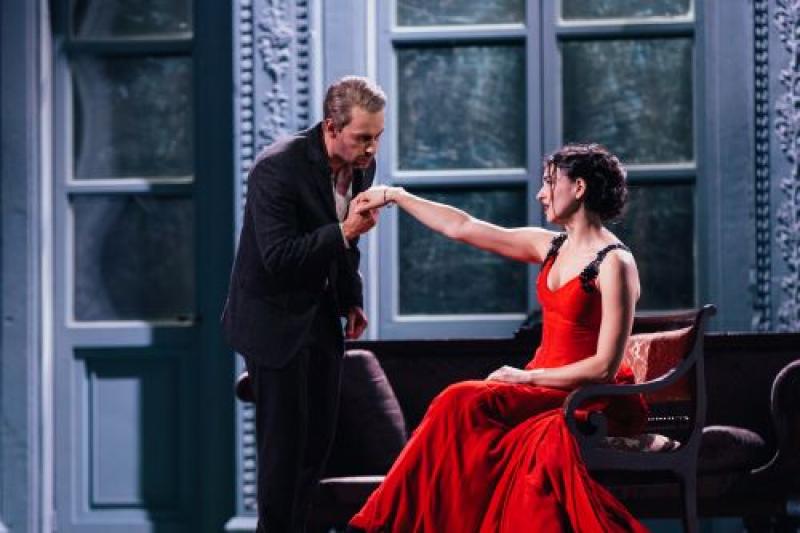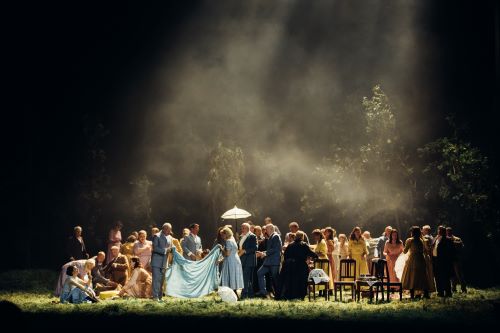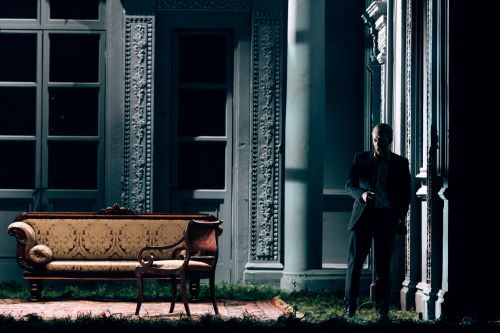Edinburgh International Festival 2019: Eugene Onegin, Komische Oper review - no-holds-barred romanticism | reviews, news & interviews
Edinburgh International Festival 2019: Eugene Onegin, Komische Oper review - no-holds-barred romanticism
Edinburgh International Festival 2019: Eugene Onegin, Komische Oper review - no-holds-barred romanticism
Stunning singing in a luxuriant and lovely production

Returning to Edinburgh International Festival, Berlin's Komische Oper brought Barrie Kosky’s sumptuous production of Eugene Onegin to the Edinburgh Festival Theatre. It’s a production that isn’t trying to do anything overly clever or convey a layered meaning; it’s simple in its grandeur in that it looks beautiful, sounds beautiful, and is faithful to Tchaikovsky’s music and Pushkin’s story.
The curtain comes up to reveal a lush green stage, complete with grassy carpet and a rich forest behind, designed by Rebecca Ringst. It is the garden of sisters Olga and Tatyana’s house, and the two girls, dressed in pastel colours, sing a light-hearted duet, while two their mother and their nurse, clad in black, reminisce on their past loves and losses. Karolina Gumos, as the happy-go-lucky Olga, is cheerful and charming, as she waits for her betrothed, Lensky, sung by Ukrainian tenor Oleksiy Palchykov, to arrive. Olga’s more serious sister, Tatyana, was gloriously sung by Lithuanian soprano Asmik Grigorian. Her voice is rich and impeccably controlled, but still with a human honesty to it, which wonderfully portrayed the angst of the teenage Tatyana.The chorus, dressed in colourful, sweetie-paper shaded hues, frolic and play in the background, though this can be a bit distracting, especially the pair who are playing actual badminton on stage – what if they dropped the shuttlecock?! (they didn’t).

As Lensky arrives, he brings with him his friend Eugene Onegin, sung by German baritone Günter Papendell. Papendell has a gorgeous, velvety voice - the kind that would inspire you to write him a love letter having met him only once. The instantly lovestruck Tatyana pours out her feelings, first to her nanny Filipyevna – whose stern yet caring nature was portrayed by Margarita Nakrasova – and then in a long letter to Ongegin.
Act Two sees Tatyana’s family throw a party for her name day. Though beginning in high spirits, things soon turn sour when Lensky becomes jealous of his betrothed, Olga, dancing with Onegin. Papendell and Palchykov stagger around on stage, bottles in hand, portraying the two characters as steaming drunk, getting into a needless brawl. As the rest of the guests leave the stage, their absence is felt, and a darker sense of gravitas was brought to Lensky and Onegin’s duel scene, bringing the second act to a chilling end.

After the interval, Act Three begans, years later, in the now grown up and married Tatyana’s house. The whole fashion sense has changed too, the chorus out of their cute, colourful frocks and now in luxurious, sophisticated gowns. Onegin pays a visit to this stately home and is overcome when he sees the lady of the house is Tatyana, whom he coolly rejected all those years ago. As the realisation dawns on him, the walls and furnishings of the house are slowly dismantled from round about him, leaving him once again in the forest of Tatyana’s family home. Papendell’s impassioned duet with Grigorian, as Onegin begs Tatyana to run away with him, had a tremendous amount of emotion. Grigorian was truly fantastic here, singing with a perfect balance of vocal control and raw human emotion. As she heart-wrenchingly tells Onegin their love is doomed, it starts to rain on stage. Yes, real rain – apparently the grass is blow dried in a lorry behind the theatre after each show.
The orchestra of Komische Oper Berlin sounded tremendous under the baton of Ainārs Rubiķis, producing swooping, cinematic sounds. With polished performances both on stage and in the pit, this was a no holds barred, heart on sleeve telling of one of the greatest operatic tales of unrequited love.
rating
Explore topics
Share this article
Add comment
The future of Arts Journalism
You can stop theartsdesk.com closing!
We urgently need financing to survive. Our fundraising drive has thus far raised £49,000 but we need to reach £100,000 or we will be forced to close. Please contribute here: https://gofund.me/c3f6033d
And if you can forward this information to anyone who might assist, we’d be grateful.

Subscribe to theartsdesk.com
Thank you for continuing to read our work on theartsdesk.com. For unlimited access to every article in its entirety, including our archive of more than 15,000 pieces, we're asking for £5 per month or £40 per year. We feel it's a very good deal, and hope you do too.
To take a subscription now simply click here.
And if you're looking for that extra gift for a friend or family member, why not treat them to a theartsdesk.com gift subscription?
more Opera
 Tosca, Welsh National Opera review - a great company reduced to brilliance
The old warhorse made special by the basics
Tosca, Welsh National Opera review - a great company reduced to brilliance
The old warhorse made special by the basics
 BBC Proms: The Marriage of Figaro, Glyndebourne Festival review - merriment and menace
Strong Proms transfer for a robust and affecting show
BBC Proms: The Marriage of Figaro, Glyndebourne Festival review - merriment and menace
Strong Proms transfer for a robust and affecting show
 BBC Proms: Suor Angelica, LSO, Pappano review - earthly passion, heavenly grief
A Sister to remember blesses Puccini's convent tragedy
BBC Proms: Suor Angelica, LSO, Pappano review - earthly passion, heavenly grief
A Sister to remember blesses Puccini's convent tragedy
 Orpheus and Eurydice, Opera Queensland/SCO, Edinburgh International Festival 2025 review - dazzling, but distracting
Eye-popping acrobatics don’t always assist in Gluck’s quest for operatic truth
Orpheus and Eurydice, Opera Queensland/SCO, Edinburgh International Festival 2025 review - dazzling, but distracting
Eye-popping acrobatics don’t always assist in Gluck’s quest for operatic truth
 MARS, Irish National Opera review - silly space oddity with fun stretches
Cast, orchestra and production give Jennifer Walshe’s bold collage their all
MARS, Irish National Opera review - silly space oddity with fun stretches
Cast, orchestra and production give Jennifer Walshe’s bold collage their all
 Káťa Kabanová, Glyndebourne review - emotional concentration in a salle modulable
Janáček superbly done through or in spite of the symbolism
Káťa Kabanová, Glyndebourne review - emotional concentration in a salle modulable
Janáček superbly done through or in spite of the symbolism
 Buxton International Festival 2025 review - a lavish offering of smaller-scale work
Allison Cook stands out in a fascinating integrated double bill of Bernstein and Poulenc
Buxton International Festival 2025 review - a lavish offering of smaller-scale work
Allison Cook stands out in a fascinating integrated double bill of Bernstein and Poulenc
 Tosca, Clonter Opera review - beauty and integrity in miniature
Happy surprises and a convincing interpretation of Puccini for today
Tosca, Clonter Opera review - beauty and integrity in miniature
Happy surprises and a convincing interpretation of Puccini for today
 Hamlet, Buxton International Festival review - how to re-imagine re-imagined Shakespeare
Music comes first in very 19th century, very Romantic, very French operatic creation
Hamlet, Buxton International Festival review - how to re-imagine re-imagined Shakespeare
Music comes first in very 19th century, very Romantic, very French operatic creation
 Falstaff, Glyndebourne review - knockabout and nostalgia in postwar Windsor
A fat knight to remember, and snappy stagecraft, overcome some tedious waits
Falstaff, Glyndebourne review - knockabout and nostalgia in postwar Windsor
A fat knight to remember, and snappy stagecraft, overcome some tedious waits
 Salome, LSO, Pappano, Barbican review - a partnership in a million
Asmik Grigorian is vocal perfection in league with a great conductor and orchestra
Salome, LSO, Pappano, Barbican review - a partnership in a million
Asmik Grigorian is vocal perfection in league with a great conductor and orchestra
 Semele, Royal Opera review - unholy smoke
Style comes and goes in a justifiably dark treatment of Handelian myth
Semele, Royal Opera review - unholy smoke
Style comes and goes in a justifiably dark treatment of Handelian myth

Comments
As good an opera production